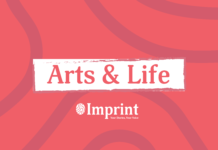Transmen, transwomen, allies, and everyone in between joined together under gender-smashing signs and marched on Friday, June 26 as part of the annual Trans* March at Toronto Pride.</p>
The Trans* March is an integral part of the weekend culminating Toronto Pride born out of the Stonewall riots of 1969 in New York City. During Stonewall, most of the people that were arrested were trans people who were unable to produce IDs which had a gender corresponding with their gender expression.
Rachel Clark, on the board of directors for Pride Toronto and local trans activist, explained that, “For those of us who believe the first Pride started due to Stonewall, we must recognize the importance of the trans narrative to Pride. Having a trans march ensures that this narrative is not forgotten.”
The parade now serves as a reminder of the struggles faced by trans people, and as a platform for issues regarding trans individuals and the intersectionality between trans and race, religion, and sexuality to be heard.
“Right now, Canada is lacking in the area of trans rights, especially on the federal level, and the importance of highlighting this is paramount,” Clark commented. “It is not just our responsibility as human beings, but also if we want to be the kind of country who is a role model for other countries to follow in terms of human rights, then we must take a stand to correct it.”
Trans issues are somewhat new in terms of widespread visibility. With trans celebrities like Caitlyn Jenner and Laverne Cox becoming more commonplace, Canada is now in a position to host more open discussions about what we do both on a national and local level to, as Clark put it, “accept trans people into our spaces [and] fight for their inclusion.”
Looking at the issues on a local level, the University of Waterloo has also made strides in trans acceptance. Sev, a member of Glow since 2009, recounted the change in Glow over the years: “It was clearly much more gay-centric and they were — they didn’t explicitly say it — but they were sharing that if you do identify as lesbian you can go to Laurier instead,” Sev said.
In regards to trans-specific issues, Sev said, “Me, being at Glow today this very moment, I do feel more inclusive as I do recognize a bit of diversity, mind you … I think we definitely have a while to go. The changes I’ve seen is that there are posted unisex bathrooms at the Glow office.”
The University of Waterloo faces a unique difference from some university campuses because, as Susan Chang, the current co-ordinator of Glow, stated, “In the University of Waterloo, the general culture is more traditional in terms of gender expression so for example if you are in a faculty that is more homogenous, it would be kind of difficult to come out as trans.”
And while Chang claims that, “Glow has improved a lot in the past,” and it is true especially with the change to include “buses for free to the Trans* March in Toronto during Pride Week … to make Glow a way more open place for trans folk,” the truth remains that UW still has a ways to go.
Most universities, including UW, must deal with trans-specific issues raised in a study called, “Making campuses more inclusive of transgender students.” In the study, transgendered students discussed difficulties with university healthcare providers ignorant of trans health issues, and problems with single-sex housing and single-sex washrooms that resulted in “some trans students actively avoiding participating in campus recreation, physical education classes, and even using washrooms to their own physical detriment.”
As the study suggests, university in general is a difficult place to be trans and the University of Waterloo is no different.
Echoing the sentiments of Sev, UW still has “a while to go.”
UW not only has a “traditional gender expression,” mentioned earlier by Chang, but UW is also unique due to its high number of international students, who may come from countries that aren’t as accepting of the LGBTQ community.
In a Western University study entitled “Investigating the Experiences of Queer International Students,” it stated “international students who come to Canada to study [from] diverse ethnic backgrounds,” may come from countries that “also have different cultural and political frameworks that construct sexual minority identities in certain ways that may contrast with Canada’s.”
Paired with a centre that, according to Sev, historically has not been a safe place, it is not surprising that being out as a trans indivudual at the University of Waterloo could potentially be difficult.
For trans people, the march is an opportunity to shed the places they live, work, or study. They can shed unaccepting peers or family, and be able to gather once a year amongst people like them and those, like PFLAG, who support them.
As Clark said, “Although I am proud of being a strong transgender woman, being transgender does not solely define me or who I am. I am a compassionate activist, interesting writer, and excellent student. These are things I want to be known for.”
Just like sexual orientation, being trans is only a facet, albeit an important facet, of a person. But as Clark said, “Coming to the Trans* March means that you want to be a part of the discussion instead of a bystander, and your participation will mean so much to so many.”




























